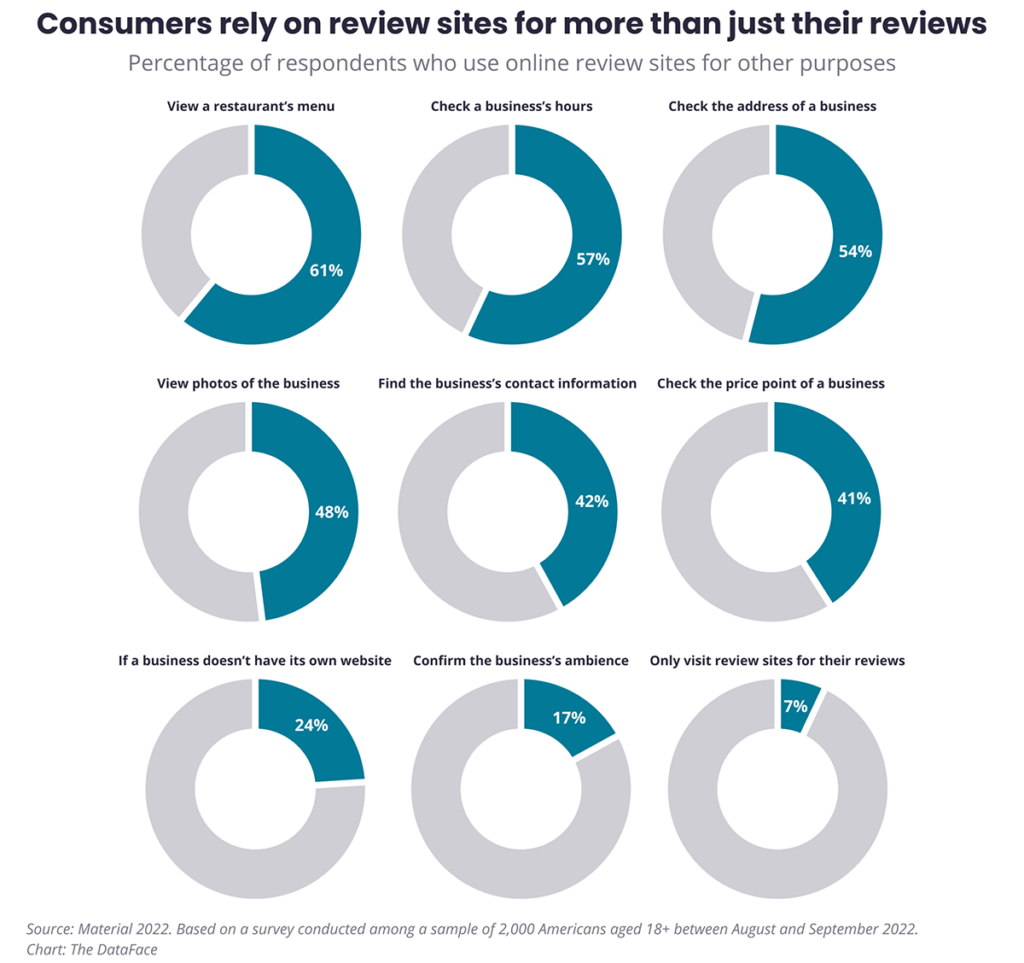Best marketing for a new business: 10 must-try ideas

Key takeaways
- Create buyer personas to help you determine your target audience
- Develop a marketing plan based on one or more marketing strategies, such as search engine advertising or content marketing
- Continue to build your small business brand by responding to reviews, hosting contests or giveaways, and earning free, local media attention
Starting a new business comes with numerous responsibilities: finding a location, hiring employees, obtaining a business license. But often the biggest hurdle is simply getting your name out there. What’s the best marketing for a new business? How do you let potential customers know your business exists?
Marketing strategies for a new business differ from marketing ideas for an established business because there’s no name recognition to rely on. Plus, as a new business, you may be looking for cheap or free marketing strategies you can implement on a budget.
Learn about affordable marketing for new businesses, including unique ways to advertise a small business that you can implement right away.
What are the best small business marketing strategies?
Unlike small business branding, which is how you differentiate yourself from your competitors and build brand awareness, small business marketing is how you get the word out about your business and encourage existing customers to return.
Small business marketing can take many forms, including B2B marketing (in which you primarily sell goods or services to other businesses) and B2C marketing (in which you sell directly to consumers). You can also choose between offline marketing, such as traditional advertising like direct mail, and online marketing tools like digital ads.
The best marketing for a new business depends on your business location, target audience, and marketing budget.
Here are six types of marketing for new businesses to consider.
Search engine marketing
Search engine marketing is a strategy for getting your brand to appear on search engine results pages (SERPs). The goal is to show up when people search for a term that’s related to your business, such as “dog walkers near me.”
There are two approaches to search engine marketing: advertising and optimization. With advertising, you pay for digital ads to appear above or alongside search results. Search engine ads are usually pay-per-click (PPC), which means you only pay if someone clicks on them.
On the other hand, search engine optimization (SEO) is a free marketing strategy that involves creating content that’s related to search engine queries. Instead of paying for your ad to show up on SERPs, your website could contain content related to pet care that shows up in search engines organically.
SEM, both advertising and SEO, are low-cost strategies that can help a small business reach new customers, but it can take time for these affordable marketing ideas to pay off.
Social media marketing
Social media marketing is another inexpensive marketing idea for new businesses because you don’t have to pay to sign up for social media platforms. Most platforms will let you create a business account for free, with the option to extend your reach through paid advertising tools like LinkedIn Ads or Facebook Ads.
There are several ways to use social media for small business growth. The first is to use it as a communications channel to post news about your business, share relevant content related to your industry, and announce sales and special offers. Social media is a great place to show off your brand voice and develop a strong brand personality.
Small businesses can also use social media accounts to engage with their customer base and respond to customer inquiries or complaints. To balance your social media campaigns with other marketing efforts, use a content calendar to schedule social media posts in advance with the power of automation.
Email marketing
Email marketing is important for small businesses that have a long sales funnel or that want to drive repeat business even after a customer has made a purchase. An email marketing campaign can lead customers through all four stages of the sales funnel, from awareness of your brand all the way to making a purchasing decision.
An email campaign starts with a lead magnet: a high-quality incentive that encourages customers to sign up for your mailing list. Once you have customers in your email list, you can build a drip campaign to hold their interest, resolve any concerns they have about your business, or offer them a special deal or coupon.
An email list also allows you to stay connected with new customers after they’ve made a purchase. This can help you maintain cash flow even if your industry has an off season. If you’re a landscaping business or a tax preparer, offer early-bird pricing for customers who plan ahead and book next year’s services early.
Referral marketing
Referral marketing is an inexpensive marketing strategy that relies on word of mouth to attract new customers to your business. The simplest option is to provide a discount or cash incentive to customers who tell a friend or family member about your business.
Some local businesses may be able to keep track of referrals manually, but ecommerce businesses in particular should use referral links or codes to automate the process.
A referral program is a win-win solution because it rewards existing customers for their loyalty while attracting new customers to your business via word of mouth.
Content marketing
Content marketing is a digital marketing strategy that focuses on providing value to your target market—even if they never become paying customers. Content marketing helps you build your brand and make a good impression on your audience.
Consider a real estate company that makes an infographic about housing prices in your area. They don’t charge anyone to view the content, but it’s so useful that some of the people who view it post about it on social media or forward it to their friends. The next time one of them wants to buy or sell a house, they remember the helpful real estate company that seemed to know what they were talking about.
Content marketing is a great option for small businesses and entrepreneurs who want to present themselves as experts in their industry. Some people will learn everything they need to know from your free content, some will purchase the tools or software they need from your business, and others will hire you to do the work for them.
Influencer marketing
Influencer marketing is another kind of word-of-mouth marketing that’s similar to referral marketing. But instead of asking customers to tell their friends about your business, you hire a professional influencer to share quality content with a target market.
Influencer marketing can cost more than other marketing channels, but it can be an effective way to reach specific demographics. TikTok is the go-to platform for Gen Z users while Instagram is known for its fashion, beauty, and travel content.
Be sure to choose an influencer who can reach your target customers, aligns with your brand’s values, and will work with you to produce high-quality content.
5 steps to market a new business on a budget

Once you have a few affordable small business marketing strategies in mind, you’ll want to make them a reality without blowing your budget. Do you have to hire consultants, social media managers, and other marketing professionals?
Not necessarily. While hiring a graphic designer or copywriter could be worth it, there are plenty of inexpensive marketing ideas you can implement yourself. Follow these steps to create a cost-effective marketing strategy for your small business.
1. Develop buyer personas
Buyer personas help you get specific about who it is you’re marketing to. Are your ideal customers college students moving out of home for the first time or are they working professionals willing to invest in premium goods and services?
Buyer persons aren’t stereotypes; they’re detailed characters you can picture in your mind when posting on social media or creating ad campaigns. Give them names, ages, and backstories—and use stock photos and create imaginary social media profiles.
If you’re a B2C company, your buyer personas may be new parents or homeowners; if you’re a B2B company, they may be executives or entrepreneurs.
2. Refine your small business branding
Choosing a business name and designing a logo can seem like an unnecessary delay when you just want to get your first customer. But taking time to develop a consistent brand identity will pay off and help you build a loyal customer base.
If you haven’t yet, decide on your brand’s visual identity and the types of images you’ll use on social media or in advertising. Will you use actual images of your business and employees or will you rely on stock photos? What tone of voice will you use in your advertisements?
Write down your brand guidelines so that anyone who works on your small business marketing campaign follows the same standards. Make sure that your logo and brand identity adheres to industry conventions—such as solid, bold text for real estate or clean and simple design for health care—but is distinct from your closest competitors.
3. Create a marketing plan
Your marketing strategy is your overall approach to promoting your small business based on whether you want to scale up quickly or focus on slow but steady growth. Your marketing plan is how you put your strategy into action with specific, concrete steps.
A marketing plan should include a summary of your objectives, budget, and timeline for each marketing idea. It could be as simple as gaining a specific number of followers on a specific social media platform or increasing the average click-through rate of your email drip campaign by a certain percentage.
Since each marketing idea requires time to implement, allocate resources to address your highest priorities first. Use the analytics tools built into your website or marketing platforms—like Yelp or Mailchimp—to track your metrics over time.
If a particular initiative doesn’t achieve the desired results, consider tweaking it or trying a different approach.
4. Build your online reputation
As your business grows, so will your online reputation. Customers will leave reviews for your new business, whether it’s on social media or online platforms like Yelp. Be proactive about your reputation by adding or claiming your Yelp Business Page and responding to customer reviews—both positive and critical ones.
Outside of reviews, many customers are often seeking out other types of info as well. In fact, just 7% of all respondents from a recent survey* say they visit online review sites only for the reviews. Many rely on finding other helpful details about a local business, like viewing a menu (61%), confirming operating hours (57%), and checking the address (54%).

No matter where your business info lives, from social media to Yelp to your website, be sure every location has the most accurate and up-to-date information. Having a consistent NAP—name, address, and phone number— across the internet helps demonstrate that your new business is here to stay, makes it easy for potential customers to contact you, and can boost your site’s local search rankings.
5. Invest in online advertising
Some of the best marketing ideas for small businesses are free, but paid ads can have a powerful impact, especially if you’re just getting started and need to generate leads quickly.
Most digital ads are pay-per-click (PPC) so there’s no upfront cost or long-term commitment. As an advertiser, you only pay when someone clicks on your ad, and you can set a maximum ad spend to avoid going over budget.
With Yelp Ads, your business page is placed in key places on Yelp.com and the Yelp mobile app, such as above or below relevant search results in the “Sponsored Results” sections and on your competitors’ pages—helping you get more leads. In fact, businesses that use Yelp Ads get 2.5x more leads on average. You can target users by keyword and location to ensure your ad is shown to the right people. Plus adjust your ad spend or cancel at any time.
Best marketing for new businesses: 10 easy marketing ideas
Sometimes you hit on a free marketing tactic that keeps driving customers to your business for years to come. Other times, the landscape changes and the referral program or search engine traffic you relied on no longer drives business growth.
In that case, the best marketing for a new business is the next one. By innovating and thinking outside the box, you’ll reach new customers before your competitors. Check out these 10 creative marketing tips to get inspired.
Partner with another local business
Team up with another local business to get the word out about both of your companies while saving money on marketing costs. This works best if the other business has an established clientele, but even two new companies can work together to grow their customer base side-by-side.
Look for local businesses that offer a complementary service without competing with you directly, such as a lawn care business partnering with a pool cleaning service.
Partnership opportunities can be as simple as splitting the cost of a table at a trade fair or letting a food truck sell coffee and pastries outside of your garden shop. There’s also co-branding, in which two businesses team up to market a new product or service that neither one offers on its own.
Host a contest or giveaway

The right contest or giveaway can help you grow an email list from scratch or reboot a referral program to accelerate business growth.
Your giveaway can be simple: Anyone who signs up for your email list or follows your social media accounts gets entered into a contest to win a gift card to your store. It can also be more elaborate like giving away a high-value item, such as a high-powered lawn mower or a year’s worth of pool services. This can be costly, but it’s a powerful way to draw attention to your new business.
For the broadest reach, encourage people to submit user-generated content like a social media post saying what they love about your business. Everyone who comments on a post or uses a particular hashtag gets entered into the contest, ensuring that your new business shows up on even more social media feeds.
Acquire earned media attention
Earned media refers to free marketing opportunities that you don’t have to pay for, such as an appearance in a local newspaper or on a national TV show.
This free promotion idea can be easier to earn than many small business owners think. Your local newspaper or restaurant blog might be writing a roundup of new food trucks in the neighborhood or maybe they publish a review of local restaurants once a week.
Even if you’re no longer the new business on the block, reporters may want to quote a local business owner or industry expert for an upcoming article. Sign up for networks like Help a Reporter Out (HARO) to get on their radar and get notified of new opportunities.
Optimize your website
Search engine optimization is an ongoing process. Maybe your startup ranks as the top Google search result one week but is quickly displaced by a competitor. Keep creating content to rank for new search terms or to provide the most definitive resource.
Try to strike a balance between “evergreen” blog topics—those that are timeless topics of interest among your customer base—and new trends. You never know when a new search term will be next year’s buzzword in your industry.
Create additional landing pages
Another free marketing idea for local businesses is to create a special landing page on your website for each traffic source—or even for each neighborhood you serve.
For example, Planet Maids offers cleaning services throughout New York City but visitors who search for “cleaning services bushwick” or “cleaning services greenpoint” will each be directed to their own dedicated landing page.
If you’ve partnered with another business that sends traffic to your website, you could create a unique landing page that says “Friends of [x] are friends of ours!”
Create a loyalty program
Referral programs reward customers for telling others about your business while loyalty programs reward them simply for showing up. Stick with the tried-and-true “Buy 10 coffees, get one free” or go for something a little more complex.
Point-of-sale systems like Square make it easy to customize your loyalty program by offering various “points” based on the purchase size or frequency of visits. Loyalty programs are a low-cost marketing idea for small businesses that can keep customers coming back because no one likes to leave a reward sitting on the table.
Segment your email list
If you’ve built an email list only for it to deliver underwhelming results, segment it to provide more targeted campaigns and special offers. Email segmentation basically means grouping your email subscribers into categories based on their age, location, purchase history, or other information they’ve shared with you.
Let’s say you’re an accounting startup catering to both businesses and freelancers. You’ve been sending out a newsletter with financial tips for business owners and your click-through rate has steadily declined. It turns out that half of your subscribers don’t own businesses and want tips on how to navigate the gig economy.
By separating your list into B2B and B2C customers, you’ll be better able to market to each demographic and provide an appropriate call to action.
Engage with customer reviews
Some small business owners take a hands-off approach to reviews or simply don’t have time to catch up on the latest reviews at the end of the work day. But many customers use reviews as a way to document a positive experience, express their frustration, or communicate what they’d like to happen differently next time.
And responding to those reviews is a great way to build consumer trust with your business—in fact, 56% of respondents say an owner replying to customers’ reviews would make them trust the business more. Similarly, 87% of review readers say they’re more likely to look past a critical review if they see that the business has responded and adequately addressed the issue.*
Plus, responding to customer reviews helps boost your SEO on search engines and business platforms.
Responses should be prompt, relevant, and authentic to build a connection.
Create a lead magnet
Lead magnets are a cheap, effective marketing idea that can help you grow your mailing list by providing a free gift or download in return for a customer’s contact information.
According to research by BCG, “30% of respondents… are willing to share their email addresses with a given company for no incentive. However, 90% are willing to share that data when presented with the right value exchange.”
Popular lead magnet ideas include ebooks, infographics, case studies, and checklists. Some businesses even offer in-person lead magnets, such as a free consultation or a free training session with no commitment. Having several lead magnets can attract a wider range of customers who respond to different incentives.
Host a webinar
Some business offerings are hard to explain and require a longer sales funnel. Maybe potential customers need to see your software in action to understand what it does or maybe your online courses revolve around your vibrant personality.
A webinar is basically a lead magnet in the form of a video conference. Customers need to provide their email address in order to attend or access the recording, but it can also serve as a tutorial, product demo, or even a sales pitch.
Host a webinar on a video conferencing platform or schedule a live broadcast on your favorite social media network to reach new customers where they’re at.
Get more leads with these easy digital marketing ideas for business growth

Marketing a new business starts with creating a brand identity, developing a marketing strategy, and providing a positive customer experience. Establish an online presence on search engines, social media, and business platforms like Yelp, then use digital advertising to expand your reach.
Once you put your plan into action, these affordable digital marketing ideas for small businesses can pay off for years to come. For more ways to attract more customers, consider these lead generation ideas.
*Material Survey 2022. This survey was fielded by Material among 2,000 people aged 18+ in the United States. The survey was conducted online during the period of August and September 2022 and has a margin of error of +/- 2%. Results of any sample are subject to sampling variation. The magnitude of the variation is measurable and is affected by the number of interviews and the level of the percentages expressing the results.
The information above is provided for educational and informational purposes only. It is not intended to be a substitute for professional advice and may not be suitable for your circumstances. Unless stated otherwise, references to third-party links, services, or products do not constitute endorsement by Yelp.




